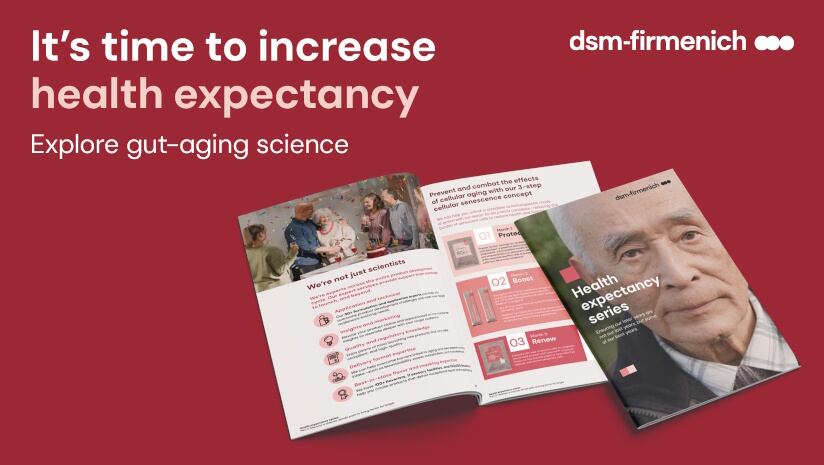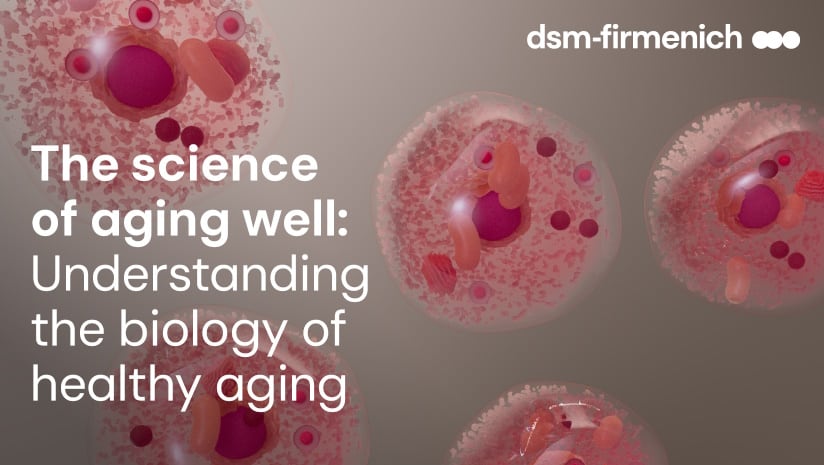Consumer perceptions of health and wellbeing are changing. Today, consumers are taking control of their health and are seeking out science-based, health benefit-driven nutritional solutions that meet their specific needs, including personalized offerings. The nutrition industry needs to change to thrive in this new environment. Recognizing that, DSM has adapted its business model and adopted a purpose-led brand strategy tailored to the evolving needs of its customers and their end consumers.
How consumer priorities are changing
The years before COVID-19 began were characterized by rising numbers of consumers who took a more engaged and holistic approach to their health. As the pandemic brought the importance of good health into sharp focus, evidence emerged that the crisis was driving even more people to proactively manage their wellbeing, notably the state of their immune systems.1
To better understand current and emerging consumer attitudes to immunity and nutrition, DSM surveyed 12,000 people across 24 countries.2 The study confirmed that consumers are concerned about their health and are taking actions intended to help them live longer, healthier lives.
The research, for example, found that 65% of respondents are worried about their vulnerability to disease, despite most having no pre-existing health issues. Eye health was the biggest concern (67%), followed by energy levels (66%), protection against disease later in life (66%) and weight (64%).
Nutrition is important for 81% of global consumers to maintain good health, with 34% and 26% of people actively including vitamin-rich foods and dietary supplements, respectively, in their diets. Popular ingredients include vitamins C, D, A, E, B vitamins, calcium, iron and omega-3 fatty acids. Yet, almost half of respondents (45%) are worried about not getting the right nutrition from their diet. Cost, confusion over what products to consume and scepticism towards the benefits of these nutritional solutions are the main barriers to use.
DSM’s survey also shows that consumers are open to moving away from that mass-market model and into an era of personalized nutrition to achieve their health goals. Weight loss, healthy aging and immunity are the most frequently cited motivations, but consumers are also keen to address their heart health and mental wellbeing. More than half of respondents said they have already taken actions to personalize their nutrition such as blood tests (27%) and consultations on their dietary requirements (16%). And even more people are interested in these solutions; just 29% of respondents reported that they would not consider any actions related to personalized nutrition.
Several barriers stand between the industry and the conversion of consumer interest in personalized nutrition into consistent purchases of tailored products and services. Understanding which program to choose was the most frequently cited barrier, followed by access to products other than tablets and capsules and the perceived complexity of personalized nutrition.
The survey data shows that a growing number of consumers are looking for science-based nutritional solutions that help them address their specific health concerns and achieve their health goals. Those interests and objectives are a relatively new phenomena that presents an exciting opportunity for brand owners to bring health-benefit driven foods, dietary supplements and personalized nutrition solutions to market. However, to appeal to today’s discerning and knowledgeable consumers the industry has to overcome barriers around cost, confusion and scepticism.
Adopting a purpose-led brand strategy
DSM foresaw changes to the health and nutrition market and made a series of acquisitions to gain specific expertise and capabilities that complement its existing offering and equip it to help customers meet the evolving demands of their end consumers. This has led to an evolution of DSM’s business model.
The ultimate goal remains keeping the world’s growing population healthy, but how that is achieved in the 2020s will differ from the past. DSM saw that its customers will benefit from end-to-end support from concept to consumer, leading it to adopt a purpose-led brand strategy that better communicates how it can support the development of science-based, health benefit-driven nutritional solutions. For DSM, purpose starts and ends with the consumer.
High-quality ingredients, the bedrock of DSM’s business, will remain an important part of the offering but are only one element of how the company supports its partners. As an innovative partner, DSM is increasingly customizing its products to meet the specific needs of customers and their end consumers – alongside providing end-to-end support with formulation, marketing and every other step on the journey from concept to the retail shelf.
The offering spans high-quality products, customized solutions and expert services. No longer just an ingredient provider, DSM is now an end-to-end, purpose-led partner with the flexibility, agility and collaboration food and nutrition brands are looking for.
The new model is accelerating progress towards DSM’s wider purpose of creating brighter lives for all. Working toward that purpose starts and ends with consumers. By connecting with people and understanding their needs, DSM supports its customers in creating nutritional solutions that resonate with today’s consumers and enable them to meet their specific health and wellness goals.
To find out more about how you can partner with DSM to create products with purpose, visit our website.
References
1. Impact of COVID-19 on Vitamins, Minerals and Supplements, https://www.lek.com/insights/ei/impact-covid-19-vitamins-minerals-and-supplements
2. DSM Consumer Health Concerns Study, 2021.







